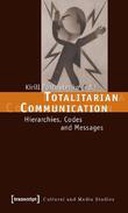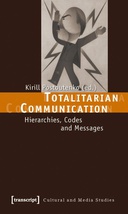Explore

Totalitarian Communication
Kirill Postoutenko
2010-2014
0 Ungluers have
Faved this Work
Login to Fave
By using history and theory of communication as an integrative methodological device, this book reaches out to those properties of totalitarian society which appear to be beyond the grasp of specific disciplines. Furthermore, this functional approach allows to extend the analysis of communicative practices commonly associated with fascist Italy, Nazi Germany and Soviet Union, to other locations (France, United States of America and Great Britain in the 1930s) or historical contexts (post-Soviet developments in Russia or Kyrgyzstan). This, in turn, leads to the revaluation of the very term »totalitarian«: no longer an ideological label or a stock attribute of historical narration, it gets a life of its own, defining a specific constellation of hierarchies, codes and networks within a given society.
This book is included in DOAB.
Why read this book? Have your say.
You must be logged in to comment.
Rights Information
Are you the author or publisher of this work? If so, you can claim it as yours by registering as an Unglue.it rights holder.Downloads
This work has been downloaded 519 times via unglue.it ebook links.
- 95 - pdf (CC BY-NC-ND) at OAPEN Library.
- 205 - pdf (CC BY-NC-ND) at Unglue.it.
Keywords
- Communication
- discourse
- Europe 1900-1945
- European History
- History of the 20th Century
- KUnlatched
- Media
- Media Aesthetics
- Media Studies
- Social Science / Media Studies
- Society
- Society & culture: general
- Society & Social Sciences
- Sociology
- Sociology of Media
- thema EDItEUR::J Society and Social Sciences::JB Society and culture: general::JBC Cultural and media studies::JBCT Media studies
- Totalitarianism
Links
DOI: 10.14361/transcript.9783839413937Editions


